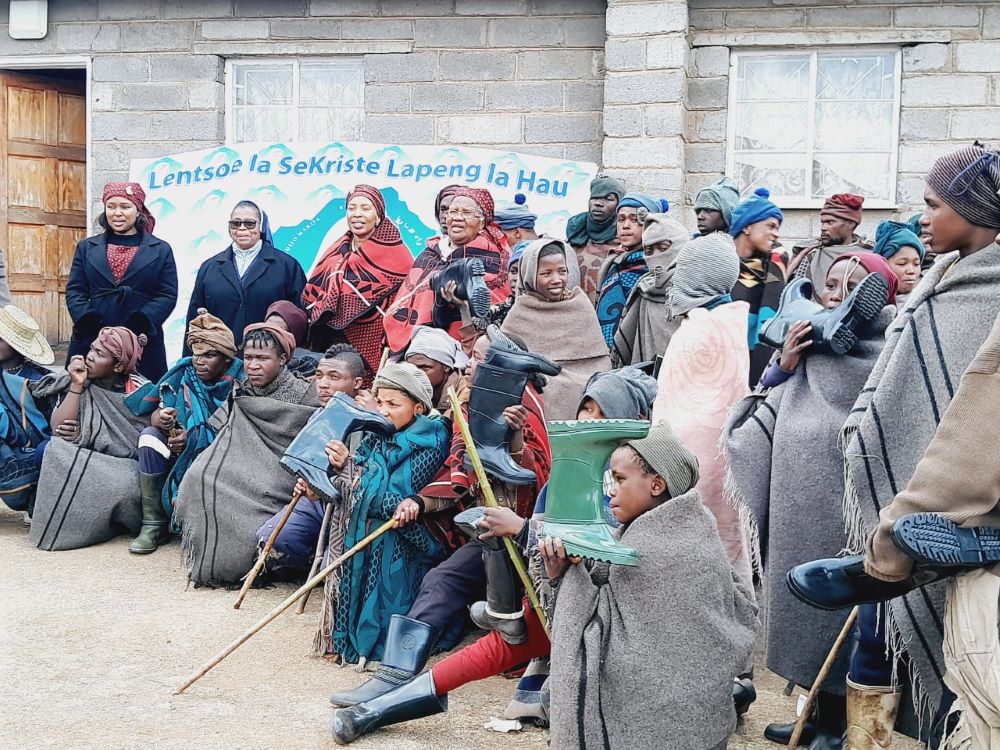Children play on a worn jungle gym at an outreach center in Durban, South Africa, run by the Daughters of St. Francis of Assisi. (GSR photo/Doreen Ajiambo)
Catholic sisters in South Africa say they are struggling to keep vital ministries alive because international donors believe the country is too wealthy to need outside help.
On paper, South Africa stands as the most industrialized economy in the continent: the country's GDP tops all of Africa at approximately $410 billion in 2025, with a GDP per capita of about $6,400, far exceeding regional peers.
But the country of 64 million can also claim another title: the most unequal nation on earth, according to the World Bank. More than half of South Africans live in poverty, and nearly 1 in 3 people cannot find work, creating a divide so deep that wealth and hardship often live side by side in the same city.
This disconnect between economic indicators and lived reality, sisters say, has created the misconception that their ministries don't need help.
In Durban, a port city on South Africa's Indian Ocean coast in KwaZulu-Natal province, the Daughters of St. Francis of Assisi run an outreach center that serves meals, supports children with homework, and educates on HIV/AIDS and teen pregnancy. The center also helps families secure social grants and identity documents essential for work, voting, and access to services.
But money is scarce.
Despite receiving subsidies from the government and occasional donations from well-wishers, Sr. Penuel Vuyisile Mthimkhulu said that at the moment, "it is a real challenge to sustain ourselves. Some staff members have chosen to work without pay because we cannot provide them with stipends."
A sister from the Daughters of St. Francis of Assisi interacts with children at an outreach center in Durban, South Africa. For many of these children, the sisters are among the few steady figures in their lives. Their ministry operates with scarce local support. (GSR photo/Doreen Ajiambo)
Mthimkhulu said the biggest obstacle is perception.
"To the outside world, South Africa is perceived as a rich country. But every day, people are losing jobs. …Families in informal settlements are hardest hit, and children are left vulnerable to drugs and human trafficking."
She added that climate change is making matters worse. Poor families in shack settlements face devastating floods in one season and water shortages in another. "The rich can adapt. The poor cannot," she said.
Ignored by donors
Global Sisters Report visited more than 10 centers run by sisters across South Africa. Whether they ran feeding programs in urban townships or rural boarding houses and medical clinics, sisters consistently lamented being overlooked by international donors — especially those from Europe — who continue to support ministries in countries such as Kenya, Uganda and Tanzania but not South Africa.
At the Sacred Heart Child & Youth Care Centre, sisters nurture children with Ubuntu values. Their vision survives on meager local help. (GSR photo/Doreen Ajiambo)
The contrast is stark.
Elsewhere in East and Central Africa, Catholic congregations benefit from steady international support. Aid to the Church in Need funds education and training, while the Franciscan Missionary Sisters for Africa direct resources to local projects. The Hilton Foundation, a major funder of GSR, backs sisters through its Fund for Sisters, supporting initiatives against poverty, trafficking, and illiteracy. CAMECO provides communication scholarships, and Doctors with Africa CUAMM partners with sisters to expand health care.
South African congregations, however, say their pleas are routinely ignored. They said their grant applications are consistently rejected, and when they ask funding representatives in Africa why, they are told it is because South Africa is considered wealthy or economically stable compared to other African countries.
"It breaks our hearts because the needs here are real," said Sr. Basil Nzimande of the Daughters of St. Francis of Assisi, which works to combat human trafficking in South Africa. She said the main challenge is raising funds to help sisters empower families — especially women and children — to protect themselves from traffickers.
Nzimande said sisters in South Africa "struggle like others, yet our cries go unheard," adding that if they had the same level of funding as other parts of the continent, "they would have reached many people and saved more lives." She said there is "potential for growth and more needs to be done," but funding remains the project's biggest obstacle.
Several organizations declined to respond to Global Sisters Reports' questions about their funding decisions.
'We are treated like profit-making organizations'
Lesotho is an enclave country in southern Africa, completely surrounded by South Africa on all sides.

Shepherd boys and villagers gather with sisters outside a stone building where Sr. Vitalina Mohale runs a school and farming project. For many of the boys, who spend long days herding animals, the sisters' school is their only chance at education. (Courtesy Sisters of St. Joseph of St. Hyacinthe)
"International donors think [that] because South Africa is rich, the sisters here must be rich," said Sr. Vitalina Mohale, the newly appointed general superior of the Sisters of St. Joseph of St. Hyacinthe. "We are treated like profit-making organizations … but we struggle to pay workers and expand our mission."
Her congregation runs an orphanage, preschool, school for shepherd boys, bakery and farming projects. Volunteers sometimes provide food or blankets, but resources remain scarce.
Mohale said that while Lesotho is poorer than South Africa, the perception of its neighbor drags her congregation down. "When we go to meetings with funders, they group us together with South Africa. Immediately, the support dries up," she said.
On the outskirts of Johannesburg, South Africa's largest city, the Missionary Sisters of the Assumption run a primary school where more than 800 children study under a leaking roof and asbestos-lined ceilings in one of the area's poorest informal settlements.
"If repairs are not done soon, the building could become dangerous," said Sr. Mary McAteer, the congregation's leader.
Sisters at the Assisi Shelter for Children in Durban, South Africa, open their doors to vulnerable children. They say that shrinking funding means they struggle to cover food, school fees and basic needs for those in their care. (GSR photo/Doreen Ajiambo)
She spends much of her time writing proposals that go unanswered. With more support, she said, her congregation could repair infrastructure, build toilets, and improve safety. An armed man once burst into a Grade 1 classroom, she said.
"Yes, there are wealthy parts of South Africa," McAteer said. "But most of the people have been left far behind. A big proportion are desperately poor, and that's who sisters work with."
The rural squeeze
The Benedictine Sisters of Twasana, in Vryheid, KwaZulu-Natal (Diocese of Eshowe), struggle to keep their boarding house and rural clinic afloat. Once a hub funding scholarships for poor students, the hostel now operates at a loss due to declining enrollment.
"We sometimes think of closing it down," Sr. Maria Charity Zulu said. "At the end of each year, when the funds run out, we have to dip into our daily living costs just to pay the electricity bill."
The sisters' clinic, known for quality care, has lost government subsidies. Rising medicine costs force them to charge fees most families cannot afford.
Advertisement
Sisters and residents note that South Africa's skewed image has roots in its history. Under apartheid, wealth and land were concentrated in the hands of the white minority, while Black South Africans were excluded from economic opportunity. More than three decades after democracy, that inequality remains entrenched.
George Themba is a Johannesburg resident and businessman. While the country boasts gleaming financial districts and shopping malls, he said, millions of people in townships and rural villages live in conditions comparable to those in poorer African states, legacies of apartheid planning.
"They see Sandton, not Soweto," he said. "They see Cape Town's waterfront, not Khayelitsha."
Related: Migrants braving perilous journey to South Africa find refuge with Catholic Church
Solutions sisters envision
Despite hardships, the sisters stress that they are not simply asking for handouts. Instead, they are focused on building projects that can sustain themselves in the long run.
Their vision includes installing solar panels and boreholes to cut energy and water costs at outreach centers, expanding farming projects to provide both food and income for orphanages, and engaging volunteers with financial expertise to train younger sisters in project management.
They also hope to strengthen support for rural hostels and clinics so that families and children can continue to access education and health care in safe spaces.
Mthimkhulu said that renewable energy and water security are particularly urgent as the effects of climate change deepen. "The poor cannot wait for the government to fix these things," she said. "We need solutions that last."
For sisters like Zulu, the greatest frustration is invisibility. "We are here, we are working, and the need is overwhelming," she said. Still, "We are invisible to those who could help."
Mohale added: "When donors dismiss us, they are not rejecting us as sisters. They are rejecting the children we serve, the families we feed, the youth we try to keep in school."





